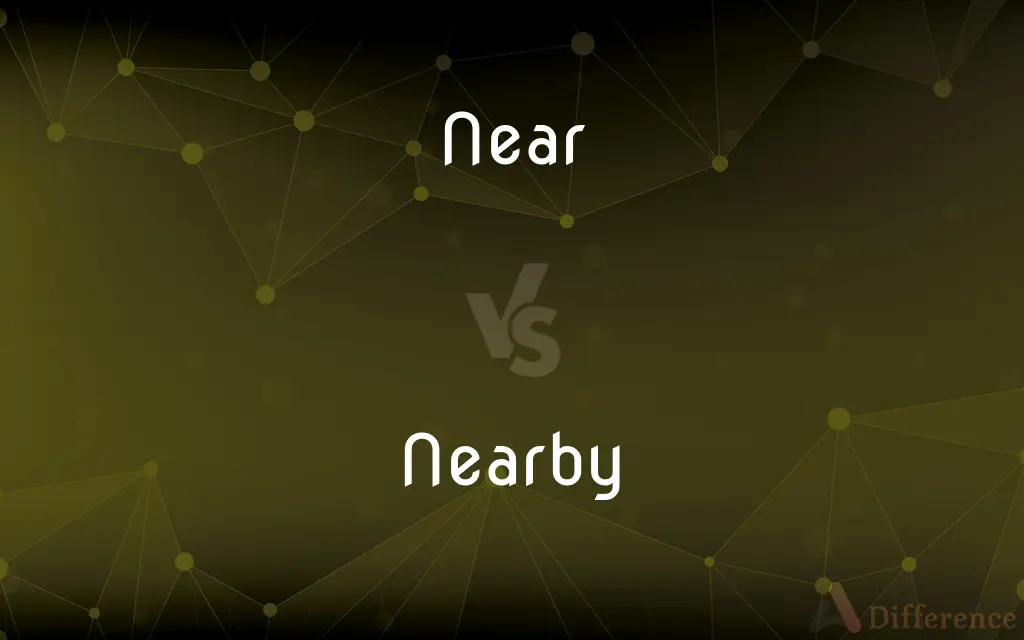Near vs. Nearby — What's the Difference?
Edited by Tayyaba Rehman — By Urooj Arif — Updated on March 30, 2024
"Near" is a preposition or adverb indicating proximity, while "nearby" is an adjective or adverb describing something within a short distance.

Difference Between Near and Nearby
Table of Contents
ADVERTISEMENT
Key Differences
"Near" serves primarily as a preposition to describe the proximity of one object to another, highlighting a relationship in space or time. For example, "The café is near the library" positions the café in relation to the library. On the other hand, "nearby" functions as an adjective or adverb, describing something that is not far away in terms of distance. When used as an adjective, it directly modifies nouns, as in "We walked to a nearby park."
The choice between "near" and "nearby" can also depend on the construction of the sentence. "Near" needs to be followed by an object when it acts as a preposition, whereas "nearby" stands alone or before a noun. This difference in usage means that "near" is more versatile in sentence structure, while "nearby" is more specific to indicating the presence of something within a short distance.
"Near" suggests a relative proximity that might require further clarification and often appears in more formal or written English. "Nearby," however, conveys an immediate sense of close proximity, typically used in spoken language or to give a more informal feel to the communication.
Both "near" and "nearby" serve to convey proximity but are suited to different grammatical structures and contexts. While "near" provides a broader application in terms of physical closeness or approaching a point in time, "nearby" focuses specifically on the spatial aspect, emphasizing the ease of reaching the nearby object or place.
Compare with Definitions
Near
Close to in space or time.
The park is near the museum.
ADVERTISEMENT
Nearby
Not far away; close by.
I think she lives nearby.
Near
At or to a short distance away; close by.
He came near to check the details.
Nearby
Situated not far away; close to.
They stopped at a nearby restaurant.
Near
A situation where an accident almost happens.
The two cars had a near miss this morning.
Nearby
The area surrounding a particular place.
We explored the nearby area for picnic spots.
Near
Short distance away, but less commonly used than "nearby" in this context.
In the near future, we plan to expand.
Nearby
To keep something within easy reach.
She always has a water bottle nearby.
Near
Similar to "near," emphasizing closeness.
We are near to completing the project.
Nearby
A town close to the reference point.
We visited a nearby town for its historic sites.
Near
To, at, or within a short distance or interval in space or time
Moved the table nearer to the wall.
As graduation draws near.
Nearby
Nearby (previously named WNM Live / Who's Near Me) is a location-based social networking service. Nearby was originally launched in June 2010.
Near
Just about; almost; nearly
Was near exhausted from the climb.
Nearby
Located a short distance away; close at hand.
Near
With or in a close relationship
It turns out we are near related.
Nearby
Not far away
She lives downtown and works nearby.
Near
Close in time, space, position, or degree
Near neighbors.
Near equals.
Nearby
Adjacent, near, close by
He stopped at a nearby store for some groceries.
Near
Closely related by kinship or association; intimate
A near relative.
A near and dear friend.
Nearby
Next to, close to
I'm glad my friends live nearby where I can visit them.
Near
Nearly occurring but not actually happening
A near victory.
A near disaster.
Nearby
(finance) A futures contract, of a particular group, whose settlement date is the earliest.
Near
Just barely avoided
A near hit by the incendiary bomb.
Nearby
Situated near; as, the nearby towns. Opposite of far away.
Near
Closely corresponding to or resembling an original
A near likeness.
Nearby
Close at hand;
The nearby towns
Concentrated his study on the nearby planet Venus
Near
Closely resembling the genuine article
A dress of near satin.
Near silver beads.
Nearby
Not far away in relative terms;
She works nearby
The planets orbiting nearby are Venus and Mars
Near
Closer of two or more
Take the near street and then turn right.
Near
Being on the left side of an animal or vehicle.
Near
Being the animal or vehicle on the left.
Near
Short and direct
The nearest route to town.
Near
(Archaic) Stingy; parsimonious.
Near
Close to
An inn near London.
Near
To come close or closer to
The plane neared the terminal.
Near
To draw near or nearer; approach
As the holiday nears.
Near
Physically close.
I can't see near objects very clearly without my glasses.
Stay near at all times.
Near
Close in time.
The end is near.
Near
Closely connected or related.
The deceased man had no near relatives.
Near
Close to one's interests, affection, etc.; intimate; dear.
A matter of near consequence to me.
A near friend
Near
Close to anything followed or imitated; not free, loose, or rambling.
A version near to the original
Near
So as barely to avoid or pass injury or loss; close; narrow.
A near escape
Near
Approximate, almost.
The two words are near synonyms.
Near
On the side nearest to the kerb (the left-hand side if one drives on the left).
The near front wheel came loose.
Near
(dated) Next to the driver, when he is on foot; (US) on the left of an animal or a team.
The near ox; the near leg
Near
(obsolete) Immediate; direct; close; short.
Near
Stingy; parsimonious.
Don't be near with your pocketbook.
Near
Within the currently selected segment in a segmented memory architecture.
A near pointer
Near
At or towards a position close in space or time. en
Near
Nearly; almost.
He was near unconscious when I found him.
I jumped into the near-freezing water.
I near ruptured myself trying to move the piano.
Near
Physically close to, in close proximity to.
There are habitable planets orbiting many of the stars near our Sun.
Near
Close to in time.
The voyage was near completion.
Near
Close to in nature or degree.
His opinions are near the limit of what is acceptable.
Near
(ambitransitive) To come closer to; to approach.
The ship nears the land.
Near
The left side of a horse or of a team of horses pulling a carriage etc.
Off side
Near
At a little distance, in place, time, manner, or degree; not remote; nigh.
My wife! my traitress! let her not come near me.
Near
Nearly; almost; well-nigh.
Near about the yearly value of the land.
Near
Closely; intimately.
Near
Not far distant in time, place, or degree; not remote; close at hand; adjacent; neighboring; nigh.
He served great Hector, and was ever near,Not with his trumpet only, but his spear.
Near
Closely connected or related.
She is thy father's near kinswoman.
Near
Close to one's interests, affection, etc.; touching, or affecting intimately; intimate; dear; as, a near friend.
Near
Close to anything followed or imitated; not free, loose, or rambling; as, a version near to the original.
Near
So as barely to avoid or pass injury or loss; close; narrow{3}; as, a near escape; a near miss.
Near
Immediate; direct; close; short.
Near
Close-fisted; parsimonious.
Near
To approach; to come nearer; as, the ship neared the land.
Near
To draw near; to approach.
A speck, a mist, a shape, I wist!And still it neared, and neared.
Near
Move towards;
We were approaching our destination
They are drawing near
The enemy army came nearer and nearer
Near
Not far distant in time or space or degree or circumstances;
Near neighbors
In the near future
They are near equals
His nearest approach to success
A very near thing
A near hit by the bomb
She was near tears
She was close to tears
Had a close call
Near
Being on the left side;
The near or nigh horse is the one on the left
The animal's left side is its near or nigh side
Near
Closely resembling the genuine article;
Near beer
A dress of near satin
Near
Giving or spending with reluctance;
Our cheeseparing administration
Very close (or near) with his money
A penny-pinching miserly old man
Near
With or in a close or intimate relationship;
A good friend
My sisters and brothers are near and dear
Near
Very close in resemblance;
Sketched in an approximate likeness
A near likeness
Near
Near in time or place or relationship;
As the wedding day drew near
Stood near the door
Don't shoot until they come near
Getting near to the true explanation
Her mother is always near
The end draws nigh
The bullet didn't come close
Don't get too close to the fire
Near
(of actions or states) slightly short of or not quite accomplished; `near' is sometimes used informally for `nearly' and `most' is sometimes used informally for `almost';
The job is (just) about done
The baby was almost asleep when the alarm sounded
We're almost finished
The car all but ran her down
He nearly fainted
Talked for nigh onto 2 hours
The recording is well-nigh perfect
Virtually all the parties signed the contract
I was near exhausted by the run
Most everyone agrees
Common Curiosities
Can "nearby" function without a noun?
Yes, when "nearby" is used as an adverb, it doesn’t require a noun, e.g., "Parking is available nearby."
Can "near" and "nearby" be used interchangeably?
While they convey similar meanings of closeness, their use in sentences differs due to their grammatical roles, making them not always interchangeable.
Is there a scenario where "near" cannot replace "nearby"?
As an adjective directly modifying a noun, "nearby" cannot be replaced by "near" without altering the sentence structure, e.g., "We visited the nearby village."
How does "near to" differ from "near"?
"Near to" is a variant emphasizing closeness, often used interchangeably with "near" but can be preferred for clarity or emphasis.
What is the difference in usage between "near" as an adverb and "nearby" as an adverb?
"Near" as an adverb often requires additional context or a preposition to clarify proximity, e.g., "He stood near." "Nearby" as an adverb is standalone, implying close proximity without needing extra information, e.g., "He stood nearby."
Is "nearby" always the better choice to describe the location of objects or places?
"Nearby" is preferred when emphasizing the short distance or easy reachability of an object or place without specifying what it's near to, making it contextually more specific than "near."
How do "near" and "nearby" compare when used in writing versus speaking?
In writing, "near" can be used more formally and in a wider range of contexts. In speaking, "nearby" is often chosen for its simplicity and directness when referring to spatial proximity.
Can "near" be used to imply a relationship beyond physical proximity?
Yes, "near" can also suggest a close relationship or similarity, e.g., "a topic near to my heart," a nuance not shared by "nearby."
Is it grammatically correct to use "near" at the end of a sentence?
Yes, it can be grammatically correct, especially when "near" is used as an adverb, e.g., "Come near." However, the clarity or specificity of "nearby" might be preferred.
Is "near" more formal than "nearby"?
"Near" can appear more formal due to its broader usage in written English and its function as a preposition.
How do modifiers affect "near" and "nearby"?
Modifiers can specify the degree of proximity for "near," e.g., "very near." For "nearby," modifiers are less common because "nearby" already implies a short distance.
Can "near" be used in temporal contexts where "nearby" cannot?
Yes, "near" can describe proximity in time, e.g., "The deadline is near," whereas "nearby" is used exclusively for spatial proximity.
How does the phrase "near me" compare to "nearby"?
"Near me" specifies proximity relative to the speaker's current location, requiring the use of "near" as a preposition. "Nearby" inherently suggests proximity without needing to specify a point of reference.
Can "near" and "nearby" be used interchangeably in legal or formal documents?
In legal or formal documents, precision is key, so the choice between "near" and "nearby" would depend on the desired clarity and specificity. "Near" might be preferred for its broader usage and compatibility with temporal contexts.
Are there instances where "near" or "nearby" should be avoided for clarity?
If exact distances are important or the context requires precise location details, it may be clearer to specify the distance or location directly rather than using "near" or "nearby."
Share Your Discovery

Previous Comparison
Memo vs. Letter
Next Comparison
Medication vs. MedicineAuthor Spotlight
Written by
Urooj ArifUrooj is a skilled content writer at Ask Difference, known for her exceptional ability to simplify complex topics into engaging and informative content. With a passion for research and a flair for clear, concise writing, she consistently delivers articles that resonate with our diverse audience.
Edited by
Tayyaba RehmanTayyaba Rehman is a distinguished writer, currently serving as a primary contributor to askdifference.com. As a researcher in semantics and etymology, Tayyaba's passion for the complexity of languages and their distinctions has found a perfect home on the platform. Tayyaba delves into the intricacies of language, distinguishing between commonly confused words and phrases, thereby providing clarity for readers worldwide.














































